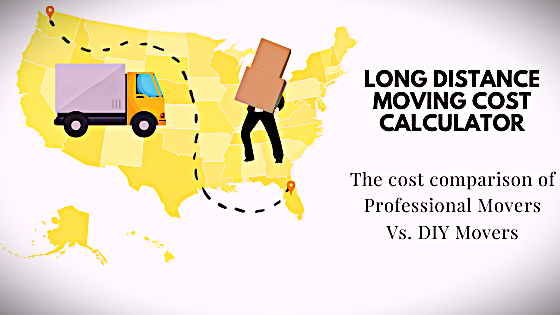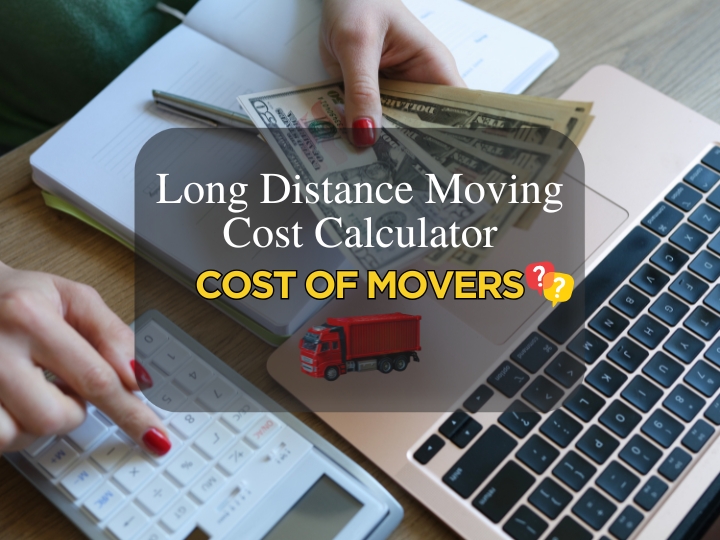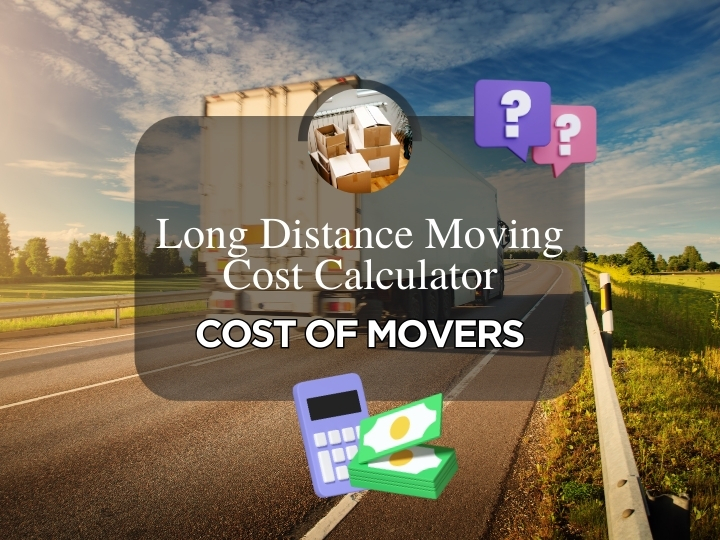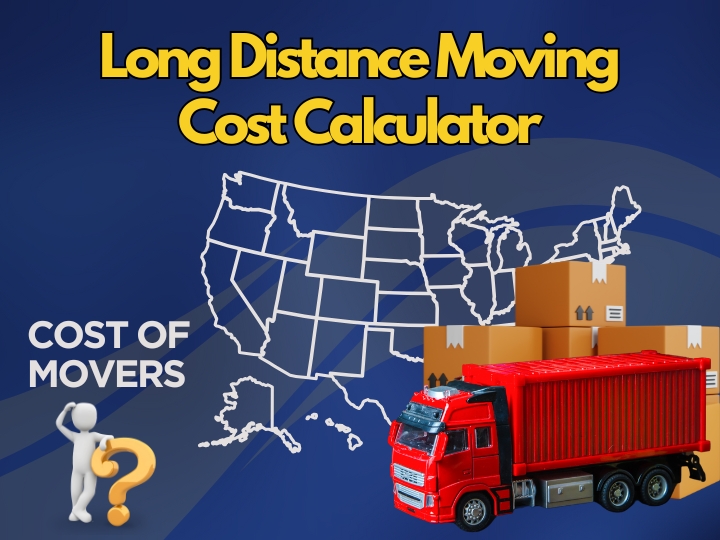Planning ahead for the cost of your move can prevent unexpected expenses on moving day. Moves, whether short or long, can be stressful but having an estimate can ease some of that stress. We’ve created a simple cost estimator for long distance moves to help you consider all the factors that influence the cost.
What counts as a long distance move? Generally, moving companies consider any move that covers 1,000 miles or more to be long distance.

Moving Costs Overview
| Move Type | Average Cost | Cost Range | Factors Influencing Costs |
| Local Move | $1,400 | $800 – $2,500 | Distance (under 50 miles), item count, season, and specific moving day |
| Long-Distance Move | $3,500 | $2,200 – $10,500 | Distance (50 to 400 miles), mover choice, item count, extra services, season, and specific moving day |
| Cross-Country Move | $7,780 | $4,400 – $17,000 | Distance (over 400 miles), item count, extra services, season, and specific moving day |
How Much Do Movers Cost?
Moving costs can differ a lot depending on your needs. According to the American Moving and Storage Association, moving a 2-3 bedroom home within your city might cost about $2,300 on average. For moving the same home across long distances (over 1,000 miles), the average cost is around $4,300, assuming you’re moving about 7,400 pounds of stuff.
It’s a good idea to use a moving cost calculator to get a better estimate tailored to your specific situation because many factors can change the price. Here are a few things that might affect your moving costs:
- Distance: Longer moves cost more.
- Packing Services: Adding professional packing can increase costs.
- Size of Your Home: More rooms mean more to move which can raise the price.
- Special Items: Items needing special care (like a hot tub or pool table) can add to the cost.
- Weight: Heavier items may increase the price.
- Timing: Moving on weekdays or mid-month can be cheaper than weekends or month-end. Summer moves typically cost more because it’s a busy season.
Local movers generally charge by the hour, with rates ranging from $50 to $200. The total cost depends on how many movers are needed for the job. For moves across the country, costs are based on the distance and the time it takes to move.
When planning a move, whether local or long-distance, there are several extra costs you might need to think about:
- Packing Materials: You’ll need boxes, tape and other supplies like dish boxes for fragile items, wardrobes for clothes and mattress bags.
- Assembly Services: If you want help setting up furniture in your new place, there’s usually a charge for this labor.
- Vehicle Shipping: The cost to ship a car can vary greatly. For a 200-300 mile trip, it could cost between $150 and $600. For coast-to-coast shipping, this cost can increase significantly especially for larger or heavier vehicles.
- Storage: If your new home isn’t ready when you arrive, you might need to store your belongings temporarily. Moving companies charge a daily rate for storage.
- Insurance: Moving companies typically offer different levels of insurance coverage but if you have particularly valuable items, you might want to look into additional insurance through a third party. It’s a good idea to talk to your insurance agent to understand the costs.
Using a detailed moving cost calculator, like the one mentioned, can help you get a clearer idea of what your specific move might cost, factoring in all these potential expenses.

How to Calculate Moving Costs?
To get an idea of what your move might cost, you can use our long distance moving cost calculator. This handy tool considers various factors that impact the price of your move. It looks at the distance you’re moving, the size of your place (whether it’s a home or an office) and any extra services you might need, like packing or temporary storage.
The calculator uses current rates in the moving industry to give you an estimated cost. This is especially helpful if you’re not sure how to start estimating moving expenses. Just enter the details of your move into the calculator and it will quickly provide you with a ballpark figure for the total cost.
What Does It Cost to Hire a Long Distance Moving Company?
The cost of hiring a moving company for a long distance move varies. For instance, moving a two to three-bedroom home over 1,000 miles typically costs around $6,300, while moving a one-bedroom apartment the same distance averages about $3,500.

Hiring a professional moving company can simplify your move. They provide a personal moving coordinator to ensure everything goes smoothly from start to finish. The moving team handles everything from packing and loading your belongings to transporting and unloading them at your new home. They can also unpack your items and set up furniture like beds and tables for an additional fee. Plus, they offer to come back after 30 days to pick up and recycle any boxes and packing materials for a small extra charge.
To get a more tailored estimate based on your specific needs, you can use our long distance moving calculator.
How Do Long Distance Moves Get Priced?
Long distance moving costs are based on a few key factors, the distance your items need to travel, the total weight of your possessions and other details like the moving date and any extra services you might need. The location you’re moving to can also affect the price, for example, moves to or from less populated states like Montana or Wyoming might be pricier due to fewer available moving companies.
To get an idea of what your specific move might cost, you can use our long distance moving cost calculator. Just input your details and it’ll give you an estimate that matches your family’s needs.
How Much Do Movers Cost? By Distance and # Of Bedrooms
| # of Miles | 1 Bedroom Apartment | 2-3 Bedroom House | 4-5 Bedroom House |
| 150 | $1,800 – $3,000 | $5,500 – $7,500 | $10,500 – $13,900 |
| Over 400 | $2,200 – $3,500 | $6,700 – $9,250 | $12,900 – $16,900 |
Average Cost of a DIY Move
A “do-it-yourself” move might seem cheaper but it has its costs. For example, renting a moving truck can cost up to $100 a day. If you’re moving across the country and can’t return the truck to where you picked it up, expect to pay a hefty one-way fee that could be several hundred dollars. Also, additional equipment like furniture dollies and pads aren’t included and will cost extra.
Driving a large moving van especially across long distances is another consideration. If you’ve never driven such a large vehicle, it can be daunting and potentially unsafe especially if you’re not comfortable with its size and handling. Fuel is another big expense. A 26-foot truck might only get between 7 and 8 miles per gallon and since most use diesel, it’ll be pricier than regular fuel.
Another important cost is insurance. Unlike professional movers, a DIY move means you might not have coverage for damages. Accidents can happen, whether it’s another vehicle hitting your truck or items shifting inside. Professional movers generally have insurance to cover damages, giving you options for reimbursement at fair market value or full replacement cost. Remember, the peace of mind that comes with insured professional services can often outweigh the apparent savings of a DIY move.
Many people choose to rent portable storage containers for their DIY moves. Here’s how it works, a company drops off a container at your home, you fill it with your belongings and then they pick it up and deliver it to your new place. For local moves, the cost of renting one of these containers usually ranges from $400 to $700. If you’re moving long-distance, the price can jump significantly, from $900 up to more than $4,500, depending on how far you’re moving. Typically, the rental includes 30 days of storage.
These containers come in various sizes from 7 feet to 20 feet. If you have a lot of stuff, you might need more than one container which can increase your costs. Some companies offer a discount on additional containers but it’s still an added expense.
Before settling on a DIY move with storage containers, it’s a good idea to compare costs with a full-service move. You can use a long distance moving cost calculator to get an estimate. Sometimes, the price difference between a DIY move and hiring professionals isn’t as large as you might think. Plus, professional movers offer door-to-door service which can add considerable convenience and peace of mind to your move.
Can You Negotiate Moving Rates?
Yes, in many cases, you can negotiate the cost of your move with your moving company. Most movers offer discounts and special deals from time to time. Also, many will match or beat a competitor’s written quote if you show it to them. To find out how you might save money, talk to your sales consultant. Making small adjustments, such as moving on a different day or deciding not to take large items like a pool table, can sometimes lead to significant savings.
What Items Can’t Be Moved by Professional Movers?
When using a professional moving company, there are certain items you’ll need to handle on your own or leave out of the move. These include perishable foods, live plants and any hazardous or flammable materials such as paint and propane tanks. Explosive items like fireworks and extremely valuable things such as cash, fine jewelry and important financial documents also cannot be moved by professional movers.
To help ease the stress of moving, it’s helpful to have a clear understanding of your expected moving costs beforehand. You can use a moving cost calculator to get an estimate that includes potential extra charges for packing materials and boxes. This way, you can plan your budget and logistics more effectively.
Tips to Reduce Moving Costs & Stress
Moving can be both costly and stressful, so finding ways to cut down on expenses is always helpful. Here are a couple of strategies to consider:
Pack Yourself
Using professional packers saves time but can be expensive. Packing yourself not only saves money but also lets you handle your delicate or personal items more carefully. Just be sure to give yourself plenty of time to pack properly to avoid any damage that could end up costing you more.
Get Help from Friends & Family
Asking friends and family to help with the move especially with heavy furniture, can significantly reduce your costs. But keep in mind that unlike professional movers, your helpers won’t be insured for damage. Any accidents causing breakages might not be covered, potentially leading to awkward situations or disputes. Make sure everyone involved understands this risk.
Collect Free Boxes
Start gathering boxes early from any deliveries you receive and ask friends, family or even your workplace if they have any spare boxes you can use. Just be sure to ask for permission before taking any boxes from your job.
Compare Moving Company Rates
If you’re considering hiring professionals for your move, don’t settle for the first quote you get. Compare prices from several moving companies to find the best deal.
These tips should help you save some money on your move. Also, don’t forget to use our long-distance moving calculator to get a quick estimate of your moving costs.
Good luck with your move!



